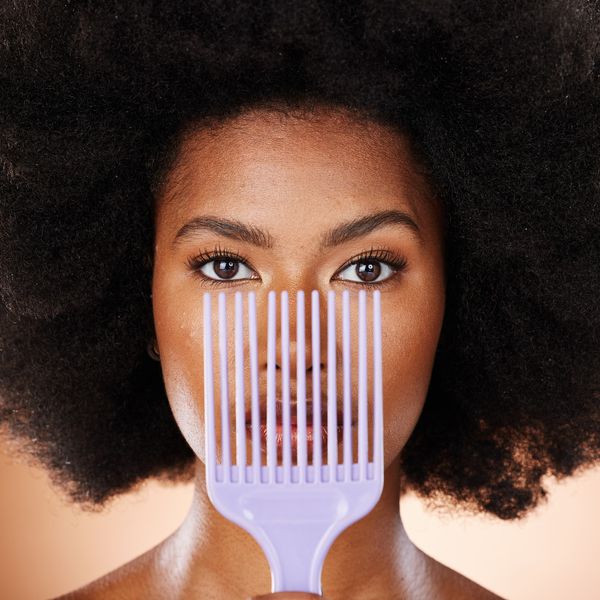
To me, a Black woman's hair is a lot like silk. In some ways, it's extremely fragile while in others, it's strong as nails. Just think about it. Our hair can endure heat, braids, weaves and wigs and all of the freaking chemicals that we put in it for weeks and sometimes even months on end. On the flip side, when we don't eat properly, stay hydrated, condition our hair and clip those split and/or dead ends, our strands can snap without barely even touching them. That is why a lot of us struggle with keeping the edges of our hair and the nape of our neck flourishing (well, that and beating our edges to death with alcohol-based edge control products).
If a goal that you've got this year is to see some more inches on your head, and you're hoping that your edges and nape will keep up, here are seven things that you can do to get both of the most fragile parts of your head to "walk in agreement" with you.
How To Grow Your Edges & The Nape Of Your Neck
1. Use Some DIY Shampoo

The sides of our hair and the nape of our neck can take on quite a bit of friction which can result in weak hair and damaged follicles. Then, when you add to that the sweat and product build-up that our hair also endures, sometimes it's best to avoid commercial brands of shampoos and go the au naturel route. If you'd like to treat your hair to a chemical-less cleaning experience, try this DIY shampoo recipe.
In a plastic bottle, mix:
- 3 tablespoons of apple cider vinegar (the kind that still has "the mother" in it; it clarifies your hair and scalp)
- 1 tablespoon of baking soda (it also clarifies your hair and scalp)
- 1 teaspoon of jojoba oil (it strengthens hair while preventing hair loss)
- 4 drops of lavender oil (it reduces scalp inflammation and encourages hair growth)
- 3 drops of tea tree oil (its antiseptic and anti-inflammatory properties remove bacteria and dead skin)
- 2 drops of peppermint oil (it stimulates hair growth)
Fill the rest of the bottle up with warm distilled water. Shake the bottle and then apply the shampoo to your damp hair, making sure to massage your scalp; especially your edges and nape. Let the shampoo penetrate for 5-7 minutes. Then rinse and deep condition (making sure to pay extra attention to your edges and nape) as usual.
2. Massage and Moisturize

Since it's the nutrients in our blood that feed our hair follicles, it is important that we increase the blood flow to our scalp. A great way to do that is to massage your scalp, for 15 minutes, no less than a couple of times each week. In fact, if you want to significantly increase the thickness of your hair, you should perform a scalp massage on a daily basis.
If you'd prefer to use an actual massager on your head, Naptural85 posted a pretty thorough review on some of her favorite ones (you can check that out here). But honestly, your fingertips can be just as effective. Another YouTuber who goes by ANGIEBEE broke down how to effectively use your hands on your head here. Please just make sure that your hands are clean, that you use the tips of your fingers and not your nails—oh, and that you put some oil on your fingers before you begin. Jamaican black castor oil is a great one because, not only does it moisturize your scalp and hair, it is also able to thicken and strengthen it over time too.
3. Add Camphor Oil to Your Hair Regimen

If you're a fan of essential oils, you definitely need to add camphor to your collection. The properties in it can do everything from reduce pain and inflammation and treat nail fungus to treat eczema and promote a good night's rest. The reason why camphor oil is mentioned in this article is because it's also a wonderful stimulant and decongestant. If you apply it to your edges and nape, not only will it increase blood circulation to those areas so that your hair follicles will get more of the nutrients that they need, but it will help to heal any scalp infections that you might have too. Just make sure to use this oil with a carrier one like coconut, grapeseed, avocado, sweet almond oil or castor oil. 15 drops of camphor in a 4 oz. bottle of your carrier oil should have you pretty set. You should start to see real results within a month or so.
4. Lower Your “Chemical Dosage”

I rocked a texturizer for many, many years. Contrary to a lot of people's beliefs about 'em, texturizers are chemical relaxers; they just aren't as strong as the ones that we use in order to get our hair bone straight. Anyway, because I would cut and texturize my hair at home (often too), when I did finally decide to grow my hair out, it took a while for one side of my edges to catch on that I was serious. What I mean by that is, all of the chemical processing (including hair dye) had actually damaged some of my hair follicles. It has taken a couple of years of scalp massaging and babying that side of my head with Jamaican black castor oil (my personal favorite brand is Mango & Lime in lavender and rosemary) to get the thickness back. What that time has taught me is, it really is best to leave the chemicals totally alone.
But, if you must, make sure that you relax and color your edges and nape last. Also, make sure you leave that stuff on for a shorter amount of time. If you're not doing that, well, it makes total sense why your edges and nape may not be flourishing as much as you'd like for them to. Chemicals tend to do more harm than good.
5. Rebuild Your Hair Follicles with Supplements

You're not going to see much change on the outside if you don't shift some of what you're feeding your insides. That said, it's not a random coincidence that a lot of people who deal with hair breakage are typically low in certain nutrients. Vitamin C (via foods like citrus fruits, sweet potatoes and tomatoes) helps to neutralize free radicals. There are studies that connect a lack of hair retention in Black women to them being low in iron (you can get more iron by eating blackstrap molasses, lentils and chicken). Zinc (by way of foods including whole grains, seeds and eggs) works to give your hair follicles the protein that they need. B-complex (which you can get from eating salmon, dark leafy greens and beef) strengthens the structure of your hair strands. Vitamin D (via cheese, orange juice and fortified cereals) helps to regrow hair follicles. If you want to get some extra support outside of adding foods with these to your diet, you can always take a multivitamin or a supplement that has one or more of these in it.
6. Move Your Hair Accessories Around

I'm a hat kind of gal. Unapologetically so. But I did have to start lining some of mine with satin and lay off of rocking them the same way all of the time because the friction was weakening the sides of my hair. I don't care if it's a brim, a headband or a turban, no one's head was designed to keep something on it, all day and night, non-stop, for days and weeks on end. When you do wear hair accessories, make sure they are lined so that your hair is protected and doesn't dry out (learn how to line a turban here and a beanie here). Try and avoid always placing your accessories in the same spot, each and every time too. And, for heaven's sake, give your hair a break. Your scalp needs to breathe, just like any other part of your body. And because your edges and nape tend to be more on the fragile side, they could use time when they don't have to deal with so much "pressure".
7. Leave Your Hair Alone

Combs. Brushes. Hair dryers. Flat irons. Hands. Bless our hair's heart. While you probably already know that constantly messing with your hair can lead to breakage and potential balding, have you ever wondered why? Dry and brittle hair tends to be the kind that breaks off rather easily and, as Black women (especially if you happen to have type 4 hair), we oftentimes have fragile hair. It's because our curls are so tight that our natural oils aren't able to easily flow from the top of our head to the ends of our hair (which is the oldest part of our hair). As a direct result, we have to be extra careful with how we handle our hair. It needs to be deep conditioned. Protective styling is a good look. But more than anything, we need to just leave it be. The more we touch and style our hair, the more we rob it of the oils that it needs to stay moisturized and "elastic". So, if you want your edges and nape to have more than a couple of inches, leave them alone so that they can grow.
Sometimes the simplest things bring forth the biggest results. Perfect edges mean nothing if they ultimately lead to baldness. Leave them be, chile. Leave. Them. Be.
Want more stories like this? Sign up for our newsletter here and check out the related reads below:
Looking For Hair Growth? It Might Be Time To Bring 'Blue Magic' Back
7 Essential Oils All Naturalistas Need For Their Hair
Uncommon (But Totally Natural) Things That Are Great For Hair Growth
These Foods Will Give Your Skin & Hair The Moisture They Crave
Feature image by Shutterstock
It's kinda wild that, in 2025, my byline will have appeared on this platform for (what?!) seven years. And yeah, when I'm not waxing poetic on here about sex, relationships and then...more sex and relationships, I am working as a certified marriage life coach, helping to birth babies (as a doula) or penning for other places (oftentimes under pen names).
As some of you know, something that I've been "threatening" to do for a few years now is write another book. Welp, October 2024 was the month that I "gave birth" to my third one: 'Inside of Me 2.0: My Story. With a 20-Year Lens'. It's fitting considering I hit a milestone during the same year.
Beyond that, Pumas and lip gloss are still my faves along with sweatshirts and tees that have a pro-Black message on them. I've also started really getting into big ass unique handbags and I'm always gonna have a signature scent that ain't nobody's business but my own.
As far as where to find me, I continue to be MIA on the social media front and I honestly don't know if that will ever change. Still, if you need to hit me up about something *that has nothing to do with pitching on the site (I'm gonna start ignoring those emails because...boundaries)*, hit me up at missnosipho@gmail.com. I'll do what I can. ;)
Exclusive: Melanie Fiona On Making High-Vibrational Music & Saying Yes To Partnership
Melanie Fiona is back! After taking a little more than a decade-long hiatus, she has officially made her return to music and blessed us with two singles, “Say Yes” and “I Choose You.” While both singles are very different from each other, they both reflect who she is today and the type of music she wants to make. In our conversation, the mom of two expressed what she learned during her time away.
“It's interesting, even when I said it is like coming back, I don't ever feel like I really left because I was always still performing. I've still been public. It's not like I went into being this recluse person or version of myself, but the thing that I really learned in this process is that I think things take time,” Melanie says in a xoNecole exclusive.
“I think often we're so caught up in it, being on the timing of demand or popularity, or, like, striking while the iron is hot and the thing that I've learned is that everything is on God's time. That's it. Every time I thought I would have been ready, or, like, things were taking too long, I had to reship some things, personally, professionally, in my life. I also gave myself permission to make a living, not just make a living, but make a life for myself.”
Making a life for herself included getting married to Grammy-nominated songwriter Jared Cotter, starting a family, and embracing new landscapes, such as podcasting as a co-host of The Mama’s Den podcast. She also began doing more spiritual work and self-care practices like meditation, sound healing, Reiki, acupuncture, and boundary setting, which allowed her to get in touch with her inner voice.
“I wasn't putting out music, and I wasn't experiencing a number one record, but I was being a number one mom,” she says.
“I was experiencing things that were allowing me to heal and get in touch with myself so that I could make new music from a space of joy and freedom, and excitement again because I definitely feel like I did lose some excitement because of just politics and industry and what it can do to your mental health and even your physical health. So giving myself the space to really just say, ‘Hey, it's okay. Everything's right on time.’”
The joy and excitement are felt in one of two new singles, “I Choose You,” which is more of a lovers rock vibe, a tribute to Melanie’s Caribbean roots. While the Grammy award-winner is known for ballads like “It Kills Me” and “Fool For You,” she is becoming more intentional about the music she makes, calling it high-vibrational music. She says her music is a “reflection of my life,” as it captures every facet, from hanging out with friends to riding around in her car.
“Say Yes” has the classic R&B vibe Melanie is known for. However, both songs are inspired by her relationship. Melanie and Jared got married in December 2020, and the Toronto-bred artist dished on their relationship. Fun fact: he is featured in the “Say Yes” music video.
“When we first started dating, I had come into that relationship post a lot of self-work. I had gotten out of a long-term relationship, I had a year and a half to date and be by myself and do a lot of work on myself alone. And when we met, I remember feeling like this has to be my person because I feel it,” she says.
“And so when we went into that relationship, and we started dating, I was very clear. I was like, I know what I want. I'm very clear on what I need, and I'm not going to withhold my truth about myself in this process because of pride or fear of rejection. I know you love me, but I'm coming with my heart in my hand to let you know that if we're gonna get there, we have to put fear aside and say yes. So that was kind of like my open letter to him, which is why the video is us having a conversation.”
Melanie also shares that saying yes to her partner has empowered her in many ways, including motherhood and showing up for herself. Her new EP, also titled Say Yes, will be available at the top of 2025.
Check out the full interview below.
Let’s make things inbox official! Sign up for the xoNecole newsletter for love, wellness, career, and exclusive content delivered straight to your inbox.
Feature image by Franco Zulueta
Entertaining Like Ayesha Curry: Expert Advice For Holidays Done Right
Be prepared to wow the crowd.
It’s officially the holiday season, which means parties and gatherings galore. Between Friendsgiving, Christmas, and New Year's Eve celebrations, many of us are preparing to host loved ones in our homes one or two times between now and the end of the year. No matter the occasion or season, hosting for family and friends is a labor of love. But we can also agree that entertaining can be overwhelming, especially for first-time hosts.
As a seasoned host and entertainer, Ayesha Curry knows something about creating a memorable event for loved ones. Whether preparing for an intimate dinner with your immediate family or hosting a larger crowd, your guests will think you are a pro this holiday season with her tips on everything from welcoming guests to setting a beautiful table.
Q: What is your top tip for hosting?
Ayesha Curry:Part of being a great host is spending time with your guests, which means you can’t be stuck in the kitchen. Prep is key! I usually serve wine with the meal, but a cocktail or mocktail is a great way to greet guests. I prep the garnish the night before and batch the drink just before guests arrive. When the party begins, I pull everything out of the fridge and am ready to serve.
Writer Note: If you would like to offer non-alcoholic beverages for your sober or sober-curious guests, I love Saint Viviana Cab. It maintains full-body cabernet and flavor; no one will ever guess it’s alcohol-free. You can easily create a signature mocktail using Bittermilk’s Smoked Honey Whiskey Sour mix.
Q: Do you suggest any prep for serving or cooking?
AC:I lay out all my serving dishes and utensils the night before with little post-it notes saying what goes where. That way, I’m not digging around for anything. For more elaborate menus, I lay out quarter sheet pans and label them with tape according to the dish. I prep and measure everything for each recipe and then load each sheet pan with everything needed to make the dish. I wrap each tray in saran or foil, stack them, and place them in the fridge. Pull out the sheet pan you need when cooking, and everything is ready. It’s something I learned at the restaurant that saves so much time.
Q: What’s one item that should always be on a dinner party menu?
AC: Bread or roll with butter is excellent for holding guests over if the kitchen is delayed.
Q: What’s one non-menu item you should always have on hand?
AC: For a non-menu item, wine!
Q: How do you decide on a theme or menu for a gathering?
AC: It all starts with the occasion and the guest list. If it’s a group that doesn’t know each other very well, I may get more elaborate with the theme to help break the ice. For a group of friends or family who don’t get to see each other very often, I usually keep it simple so the evening can be all about catching up. A great playlist, good wine, and a family-style menu are all you need.
Q: Should attendees be expected to bring a gift?
AC: If I’m hosting, I’m not expecting gifts. The gift is taking time to come over and enjoy a meal with me! But bringing something to enjoy at the gathering, like a bottle of wine, is always appreciated.
Q: What are three affordable gifts that guests can give a host?
AC:A bag of excellent coffee is a beautiful gift for a host. Sweet July’s House Blend Coffee is sourced from all-female co-ops, so it’s a gift I love to give to the women in my life. Whether it’s being served after dinner or just for the host to enjoy on their own, you can’t go wrong with a bag of high-end coffee.
Fresh flowers are great if you have a host who likes total control over the food and beverage menu. Go for something neutral in color that can work with any décor.
The Sweet July Olive Oil and Balsamic Vinegar set is my go-to host gift. Bottled in Napa, it’s a gift any foodie will appreciate - and use!
Q: What are some creative tablescape or decor ideas that you love?
AC: I like to keep my dinnerware neutral and classic (like this ceramic collection in nutmeg) and infuse color and texture through linens. For centerpieces, I want to use what I have in my yard. If it’s summer, it might be flowers or greenery, but interesting branches can also look architectural in tall, clear vases next to tapered candles in the colder months. There’s no need to spend a ton of money on flowers.
With Ayesha’s tips, you can create a holiday gathering that your family and friends will cherish forever.
Let’s make things inbox official! Sign up for the xoNecole newsletter for love, wellness, career, and exclusive content delivered straight to your inbox.
Featured image by Getty Images






